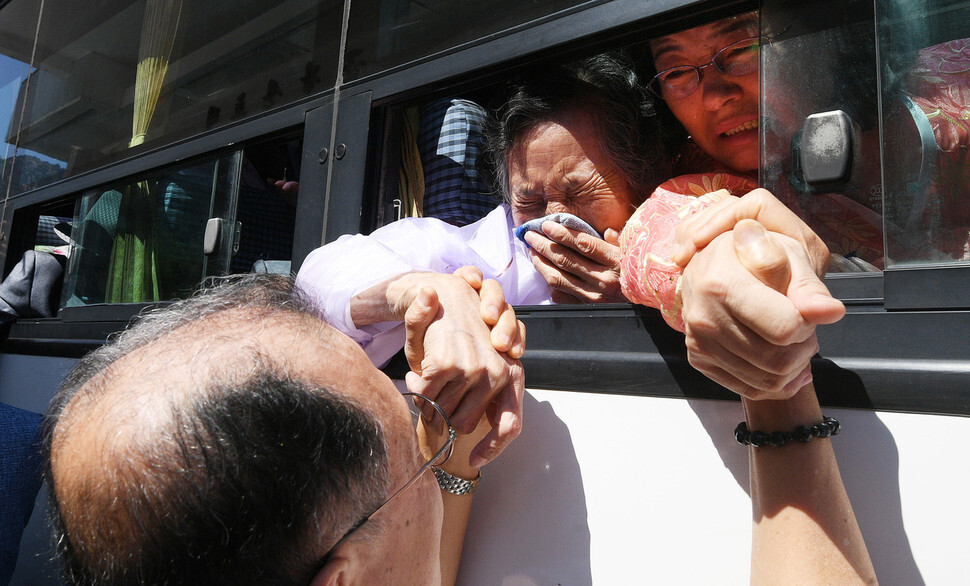Posted on : Jan.2,2020 16:59 KST
Modified on : Jan.2,2020 17:09 KST
 |
|
Family members say goodbye to each other at the end of the 21st family reunion for divided Korean families at the Mt. Kumgang resort on Aug. 26, 2018. (photo pool)
|
No reunions have taken place under Moon admin. since 2018
 |
|
Family members say goodbye to each other at the end of the 21st family reunion for divided Korean families at the Mt. Kumgang resort on Aug. 26, 2018. (photo pool)
|
South Korea is pursuing inter-Korean cooperation that would allow Koreans to reunite with their family members in their hometowns in North Korea during 2020. The reunions would occur via Chinese travel agencies and other third countries. The measure is a new solution aimed at achieving a breakthrough, as no large-scale divided family reunions events have taken place under the Moon Jae-in administration apart from one event at Mt. Kumgang in August 2018.
On Dec. 31, the Ministry of Unification announced a “third framework plan for promoting exchange involving South and North Korean divided family members,” which included measures for “promoting civilian-level exchange among divided family members.” As one method for promoting civilian-level exchange among divided family members, the ministry said it would “examine the implementation of new approaches such as hometown visits.” It did not share any specifics that day on how it would realize or support the “hometown visits.”
The most realistic alternative approach under internal consideration by the administration involves the use of travel agencies in China, which shares a 1,400km border with North Korea and accounts for an overwhelming share of its human and commercial exchange. Travel by divided family members to their North Korean hometowns to meet their relatives would entail complicated legal procedures, including the receipt of an invitation and approval for the visit -- which is the reason hometown visits have not been frequently attempted.
Such issues could be resolved with administrative support provided by Chinese travel agencies: the matters of discussions with North Korea and advising on hometown visits would be left up to the agencies, with South Korea simply resolving visit approvals. Indeed, the Ministry of Unification said on Dec. 31 that it would “consider establishing institutions and an organization for systematic support if new methods of civilian exchange are more actively adopted” -- signaling its willingness to provide systematic government support if the hometown visits can be achieved.
Unification Ministry to diversify support for divided family exchange
The administration announced plans to increase support for civilian-level exchange involving divided family members through an “amendment of the guidelines on supporting divided family member exchange costs.” The measures indicate that it plans to establish more “realistic” calculations for its support, which has amounted to 3 million won (US$2,591) for civilian-level efforts to verify whether family members are living or deceased, 6 million won (US$5,183) for reunions, and 800,000 won (US$691) for correspondence exchanges. The maximum number of support payouts is also to be increased from one to three. In a break with past practice, it plans to provide support for correspondence exchange and other costs even for divided family members who have taken part in reunion events organized by government authorities.
“We plan to continue pursuing the diversification and regularization of divided family member exchange, while also working to identify alternatives and create suitable conditions in case North Korea does not respond favorably,” the Ministry of Unification said.
By Lee Je-hun, senior staff writer
Please direct comments or questions to [english@hani.co.kr]










